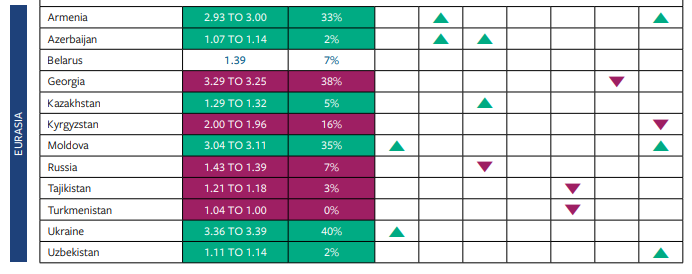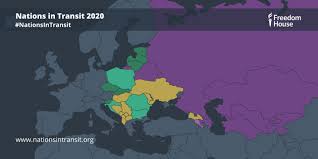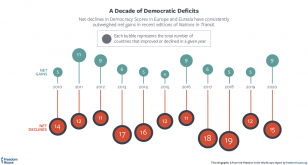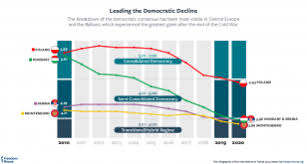
Freedom House
In its latest report, Nations in Transit 2020: Dropping the Democratic Facade, Freedom House warns of a “stunning democratic breakdown” across Central Europe, the Balkans, and Eurasia as many leaders in the region attempt to do away with any remaining checks on their power, VOA reports:
The report says the attacks on democratic institutions could be accelerated by the ongoing coronavirus pandemic, but Freedom House President Michael Abramowitz said the health crisis also creates an “inflection point” after which things could become much worse, or democracy could be revitalized.

Freedom House
“A growing number of leaders in Central and Eastern Europe have dropped even the pretense that they play by the rules of democracy. They openly attack democratic institutions and are working to restrict individual freedoms,” the group – a partner of the National Endowment for Democracy (NED) – says in its annual Nations In Transit report, released on May 6.
Key Findings:
- The number of democracies is at its lowest point in the 25-year history of the report: of the 29 countries assessed, 10 were rated as democracies, 10 as hybrid regimes, and 9 as authoritarian regimes. Over the last decade, the number of hybrid regimes has more than tripled, while the number of democracies has declined by one-third.
- The average Democracy Score for the region has declined every year since 2005—16 years in a row—but the tide might be turning. The past two years featured more improvements due to gradual reforms; in the 2020 report, nine countries improved their scores, almost double the number that registered gains in the 2019 edition.
Central Europe
-

Freedom House
Hungary has experienced the largest drop ever recorded in Nations in Transit, with its Democracy Score exceeding the average decline eightfold in the past decade. In the 2020 report, with declines related to elections, local governments, and corruption, Hungary left the group of democracies.
- Poland similarly changed categories, becoming the second European Union member state to lose its Consolidated Democracy designation, after Hungary. The country’s losses in Judicial Framework and Independence over the past five years have been the largest ever recorded for that indicator.
Balkans
- Serbia, whose scores have declined each year for five years, recently dropped into the Transitional/Hybrid Regime category. Montenegro joined Serbia in leaving the group of democracies in the 2019 report, after hovering above the threshold for a decade. Both countries registered further declines in Nations in Transit 2020.
- Positive news emerged elsewhere in the Balkans, as Kosovo and North Macedonia earned multiple score improvements. Kosovo is the only country in the report’s coverage area to secure gains in each of the last five years. Still, recent developments in both countries have cast doubt on future progress.
 Eurasia
Eurasia
- Armenia registered the largest two-year Democracy Score improvement in the report’s history, and the score has reached its highest-ever point for the country, with improvements related to elections and corruption in the latest edition. Developments regarding the judiciary, however, have raised concerns.
- The new administration in Ukraine is facing significant challenges with structural reforms and COVID-19 in 2020. Nevertheless, the election of President Volodymyr Zelenskyy and a peaceful transfer of power from the defeated incumbent in 2019 earned the country a slight improvement in its National Democratic Governance score.
- While Moldova’s “compromise coalition” of 2019 ultimately fell apart, the brief united front demonstrated a reduction in informal oligarchic control over the country’s institutions and led to improvements in its Corruption and National Democratic Governance scores.
- As several of Eurasia’s autocrats were grappling with succession plans, Russia registered a decline due to an extraordinary level of violence against protesters, and Uzbekistan’s Corruption score improved from rock bottom due to recent efforts to root out petty graft.
“It is essential for democratic countries to stand up to bullies, but that’s only possible if leading politicians promote democratic principles through their words and actions,” said Zselyke Csaky, research director for Europe and Eurasia. “So far this has been lacking, resulting in shortsighted and desultory responses. To tackle the crisis and to arrest the democratic decline, we will need cooperation, transparency, and accountability. If democracy is to survive in the world, it must be reinvigorated from the inside, by the democratic community itself.”







